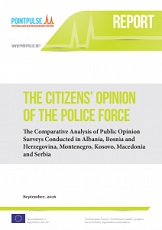2016 THE CITIZENS’ OPINION OF THE POLICE FORCE - The Comparative Analysis of Public Opinion Surveys Conducted in Albania, Bosnia and Herzegovina, Montenegro, Kosovo, Macedonia and Serbia
2016 THE CITIZENS’ OPINION OF THE POLICE FORCE - The Comparative Analysis of Public Opinion Surveys Conducted in Albania, Bosnia and Herzegovina, Montenegro, Kosovo, Macedonia and Serbia
Author(s): Sofija Mandić
Subject(s): Politics / Political Sciences, Politics, Civil Society, Security and defense
Published by: BCBP Beogradski centar za bezbednosnu politiku
Keywords: police force; Albania; Bosnia and Herzegovina; Montenegro; Kosovo; North Macedonia; Western Balkans; police sector; public opinion
Summary/Abstract: Citizens of the Western Balkans have a high level of trust and confidence in the education system, the health system and the police. However, even in the case of institutions they trust most – such as the police, trusted on average by 58% of the population – many believe that they cannot be relied on. Representative bodies (the Parliament), the judiciary, the prosecutors’ offices and the media are trusted the least. In comparison with the survey conducted in 2015, trust in most key institutions has increased. The respondents see the average policewoman first as polite and good looking, and only then as a professional ready to perform her job. Male members of the police force are associated primarily with their professional engagement – protection of citizens, someone who is strong and trustworthy – and to some extent with behaviour and method of communication, whereas assessments concerning their physical appearance are completely absent. Citizens of the Western Balkans believe that the dominant mode of employment in the police is through friends and relatives, political affiliation, or by giving bribes. Many of them also believe that police officers operate mainly to protect the interests of the government, political parties and police officials, and only then those of the citizens. Similarly, they believe that politicians have a strong influence on the operational decision-making in the police. Although more than half the citizens have confidence in the police, this institution is simultaneously also considered deeply corrupt. This suggests that corruption is percieved as something that is acceptable and normal. Awareness of corruption in the police thus persists together with a sense of trust, without these two perceptions excluding each other. Border and traffic police are believed to be the most corrupt, together with the close (political) associates of ministers of interior affairs. Special police units are viewed as least vulnerable to corruption. Citizens are divided in their opinions as to whether they would or would not report corruption, and those who would do it would first contact the local police station or its chief. Citizens believe that repressive measures would be most effective for preventing corruption. They also believe that the Government, the Minister of Interior Affairs and the internal police control should be the first to address this problem. Respondents recognise civil society as actors in the fight against corruption, but mostly as direct actors and associates of the state in this task. Only then do they recognise their contribution through research, documentation and protection of victims of corruption.
Series: BCBP - Assessment of Police Integrity
- Page Count: 33
- Publication Year: 2016
- Language: English
- Content File-PDF

